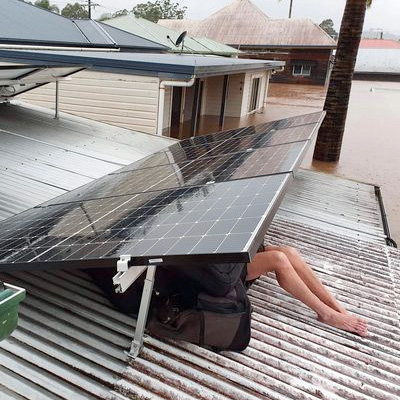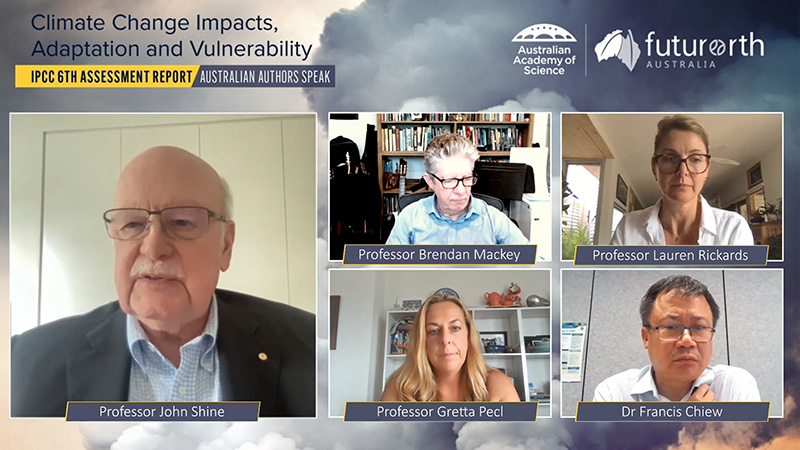What impact is our changing climate having on our lives, jobs and homes? And what policy frameworks are needed to ensure a resilient and prosperous future for Australia?
The Intergovernmental Panel on Climate Change (or IPCC) is widely regarded as the most important and authoritative source on climate change, its impacts and how to tackle the rising emissions that drive it.
Already released as part of the Sixth Assessment Report is the contribution from Working Group I, who focused on the physical science basis of climate change. Working Group III should publish their contribution on mitigation in April, and a Synthesis Report combining the three Working Group reports is scheduled for later this year.
At 10 pm AEDT on Monday, 28 February 2022, the contribution from Working Group II was released on the observed and projected impacts of climate change, the adaptation capabilities of communities and biosystems, and the vulnerabilities posed to humans and our natural systems.
But how does this specifically relate to Australia, and what can policymakers and professionals do, both inside and outside government, to make use of this resource in support of the critical decisions they make?
To answer these questions, the Australian Academy of Science in partnership with Future Earth Australia, held an online forum event to help inform and support policy makers and professionals in how Australia can reduce its vulnerability to the impacts of climate change.
The Academy President, Professor John Shine, hosted the event and introduced short presentations from four of the lead authors of the chapter dedicated to discussing the impacts and risks for Australia and New Zealand.
Professor Brendan Mackey, Director of Griffith University's Climate Action Beacon is a Coordinating Lead Author of the IPCC Working Group II.
He spoke on the observed impacts of climate change. He outlined that climate trends have caused major impacts on our natural systems, with some Australian ecosystems already having experienced irreversible changes.
"Ongoing warming is projected, with more hot days and fewer cold days, snow and glacier retreat, sea-level rise, and ocean acidification."Prof Brendan Mackey, Lead Author
He closed his presentation reminding us that climate change is not something that might occur in the future. It has happened, it is happening, and it will continue to happen into the future. It's a reality we have to deal with.
Dr Francis Chiew, a hydrologist, leads the Surface Water and Basin Outcomes research group in CSIRO in Canberra. He spoke on climate change will exacerbate the already complex challenges in managing water for competing demands in south-eastern Australia.
Finally, the frequency and severity of dangerous fire weather conditions have increased and will continue to increase with very significant consequences in this part of the world.
"This is the new reality facing Australia."Professor Francis Chiew
Professor Gretta Pecl is a marine ecologist at the Institute for Marine and Antarctic Studies (IMAS), and the Director of the Centre for Marine Socioecology (CMS) at the University of Tasmania.
She spoke on the impact of climate on the Australian economy and people, reminding us that if bleaching of the Great Barrier Reef persists, an estimated 10,000 jobs and A$1 billion per year in revenue would be lost from declines in tourism alone.
"Limiting warming to 1.5°C is insufficient to prevent more frequent mass bleaching events - but may reduce occurrence of warming events by an estimated 25%."Professor Gretta Pecl
Professor Lauren Rickards is Director of the Urban Futures Enabling Capability Platform and co-lead of the Climate Change Transformations Research Group at RMIT University.
She started by emphasising that many of the changes required are significant are not only those in the climate and physical systems, but are also in many areas not typically identified as related to climate change.
In terms of thinking of the way to progress adaptation it‘s about taking on the complexities.
"This is hard work; we need more robust systemic risk reductions we also need serious measures to reduce social vulnerabilities."Professor Lauren Rickards
She highlighted again the amazing opportunity we have to "improve on the past and present, to enhance our well-being, to restore the planet, and to actually generate thriving communities and ecosystems."
She closed her presentation by reminding us that to fuel adaptation, we have a rich resource in our communities—we need to listen to everyone.
The panel then engaged in an audience answer session. On everyone's minds was the current flooding event in south-eastern Queensland and northern NSW, and whether there was a connection to climate change.

While individual disasters cannot be explicitly attributed to being caused by climate change, the panel were unanimous that climate have made the severity and duration of the flood event much worse.
For Professor Mackey, the floods are personal. His extended family have "suffered the direct impacts of climate change", losing their house to the floodwaters in Lismore. He shared a striking image of them sheltering on a roof waiting to be airlifted to safety.
The panel also discussed whether the flood is a one-in-a-thousand-year event. The answer: it depends.
Flooding may not have happened to the same degree in some time, although there were devastating floods in 2011 and 1974.
However, looking forward into the future, it is unlikely that this kind of flooding won't happen for another thousand years.
The authors used this point to emphasise that any delay in both reducing emissions and addressing the impacts of an increasingly changed climate will mean we will miss this chance to secure a liveable and sustainable future for us all.

You can find out more about the Academy and the science of climate change by visiting our Climate Change Hub. More resources are available from Future Earth Australia, as a peak initiative in convening leaders to advance the sustainability agenda.
© 2025 Australian Academy of Science